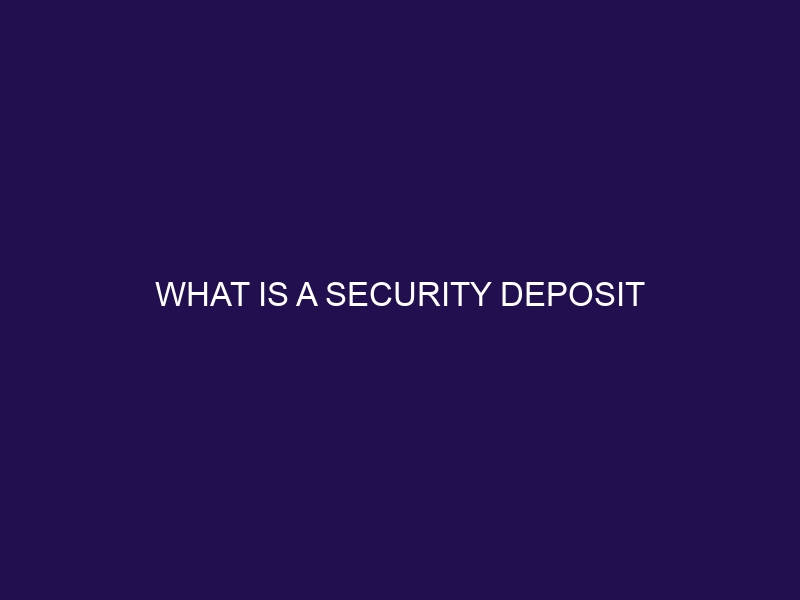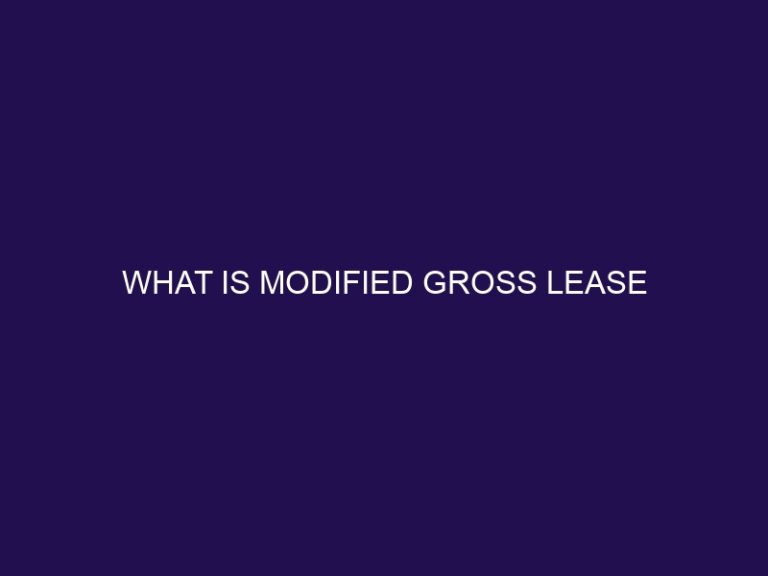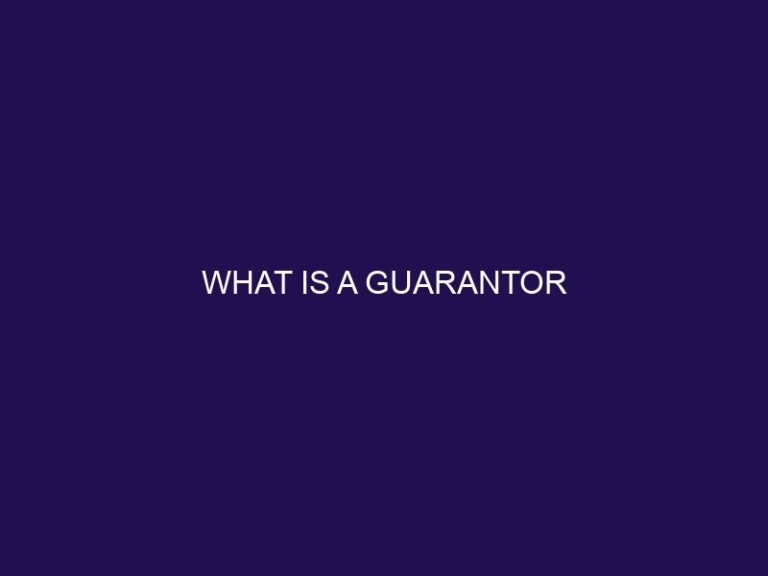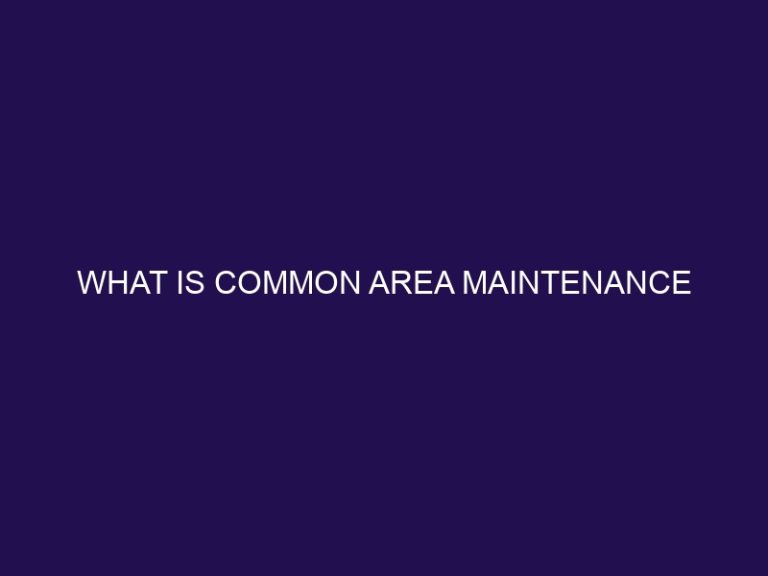What is a Security Deposit
A security deposit is a sum of money provided by a tenant to a landlord or property owner before moving into a rental property. It serves as financial protection for the landlord and assurance of the tenant’s responsibilities during their tenancy. The purpose of a security deposit is multi-fold, offering benefits to both parties involved in the rental agreement.
1. Financial Protection for Landlords: One of the primary reasons for a security deposit is to provide landlords with a safety net against any potential damages or unpaid rent at the end of a lease term. In case the tenant fails to fulfill their obligations, the security deposit can be used to cover the costs incurred by the landlord.
2. Assurance of Tenant’s Responsibilities: From the tenant’s perspective, paying a security deposit ensures that they are committed to taking care of the property and fulfilling their obligations as outlined in the lease agreement. It acts as an incentive for maintaining the property in good condition during their tenancy.
To understand how a security deposit works, it is crucial to consider two key aspects: the amount and collection of the deposit, as well as the process of holding and returning the deposit. These factors may vary depending on local laws, regulations, and the terms specified in the lease agreement.
Furthermore, it is essential to have a clear understanding of security deposit laws and regulations governing the rental property. These laws can vary from state to state and may encompass restrictions on the maximum deposit amount, rules for holding and returning the deposit, and requirements for providing written documentation of deposit deductions.
Common issues related to security deposits revolve around disputes over deposit deductions and untimely returns. It is crucial for both landlords and tenants to be aware of their rights and responsibilities and follow proper procedures to avoid such conflicts.
To protect your security deposit, there are several tips to keep in mind. Carefully documenting the move-in condition of the property, communicating with the landlord regarding any concerns or issues, and following the lease agreement terms can help ensure a smooth and fair return of the deposit.
By understanding the concept of security deposits, the purpose they serve, the legal framework surrounding them, and taking necessary precautions, both landlords and tenants can navigate the rental process with greater knowledge and confidence.
What is a Security Deposit?
A security deposit is a sum of money that a tenant gives to a landlord before moving into a rental property. What is a Security Deposit? It serves as protection for the landlord in case the tenant causes damage to the property or fails to meet their rental obligations. The security deposit is meant to cover any necessary repairs or unpaid rent. At the end of the tenancy, the landlord will inspect the property and deduct any necessary expenses from the security deposit before returning the remaining amount to the tenant. It acts as a form of insurance for the landlord, ensuring that they are not left with financial losses due to tenant negligence.
Purpose of Security Deposits
Security deposits serve a crucial purpose in the rental world, protecting both landlords and tenants. In this section, we’ll dive into the reasons behind security deposits, ensuring financial peace of mind for property owners and fostering a sense of responsibility for tenants. Unveiling the benefits and importance of security deposits, we’ll unveil the symbiotic relationship they create, ensuring a healthy landlord-tenant dynamic in the rental market.
1. Financial Protection for Landlords
Security deposits provide financial protection for landlords by safeguarding against potential damages and unpaid rent.
- Potential damages: Landlords can deduct from the security deposit to cover the costs of repairs caused by tenants, such as broken appliances or damaged walls.
- Unpaid rent: If tenants fail to pay rent, landlords can use the security deposit to compensate for the lost income.
- Legal protection: Security deposits can be held in separate accounts or through surety bonds, ensuring funds are available when needed.
- Reduced risk: Landlords can use security deposits as a deterrent, discouraging tenants from causing damage or violating rental agreements.
2. Assurance of Tenant’s Responsibilities
The assurance of a tenant’s responsibilities is an essential aspect of security deposits. These deposits serve as a financial protection for landlords and ensure that tenants fulfill their obligations. By holding a security deposit, landlords have a safeguard against any damages caused by tenants or unpaid rent. It also incentivizes tenants to care for the rental unit, motivating responsible behavior during their tenancy. In case any issues arise, such as damages or unpaid rent, landlords can deduct the necessary amounts from the security deposit. This provision helps maintain the integrity of the rental agreement and holds tenants accountable for fulfilling their responsibilities.
How Does a Security Deposit Work?
When it comes to renting a property, understanding how a security deposit works is crucial. In this section, we’ll uncover the mechanics behind this important aspect of the rental process. From the amount and collection of the deposit to the process of holding and returning it, we’ll dive into the nitty-gritty details. Get ready to unravel the ins and outs of security deposits, so you can navigate the rental world with confidence.
1. Amount and Collection of the Deposit
When it comes to the amount and collection of a security deposit, there are a few key factors to consider.
- First, the amount of the deposit should be in line with local regulations and often equals one month’s rent.
- Landlords typically collect the deposit upfront when the lease is signed, along with the first and last month’s rent.
- It is important for tenants to ensure that the deposit is placed in a separate account, often referred to as an escrow account, to protect their interests.
- A pro-tip for tenants is to carefully review the lease agreement and document the condition of the rental unit before moving in to avoid disputes over deposit deductions when moving out.
2. Holding and Returning the Deposit
When it comes to holding and returning a security deposit, there are important steps that both landlords and tenants should follow. Here is a list of crucial steps for holding and returning a security deposit:
1. Conduct a thorough move-in inspection and document any existing damages or issues with the rental unit.
2. Keep the security deposit in a separate account to ensure it is not commingled with personal funds. This step is essential for holding and returning the deposit.
3. Follow the legal requirements for holding and returning the security deposit within the specified time frame.
4. Deduct only allowable expenses from the deposit, such as unpaid rent, damages beyond normal wear and tear, or cleaning costs.
5. Provide the tenant with an itemized statement explaining any deductions made from the deposit.
6. Return any remaining balance of the security deposit to the tenant promptly.
History Example: In a notable case in 2019, a landlord failed to return a tenant’s security deposit within the required time frame. The tenant took the case to small claims court and was awarded the full amount of the deposit along with additional damages for the landlord’s negligence in handling the deposit. This case serves as a reminder of the importance of landlords adhering to legal obligations concerning holding and returning the security deposit.
Understanding Security Deposit Laws and Regulations
When it comes to security deposits, understanding the laws and regulations is crucial. In this section, we’ll dive into the world of security deposit laws and regulations, shedding light on the specific requirements set by state laws and the importance of landlord-tenant agreements. Get ready to navigate the intricate landscape of security deposits, ensuring you’re equipped with the knowledge to protect your rights as a tenant or landlord. Let’s unravel the complexities together!
State Laws and Regulations
When it comes to security deposits, it is crucial to have a good understanding of state laws and regulations to guarantee compliance and protection. Here are some crucial key points to consider in order to achieve that:
- It is important to thoroughly research state-specific laws and regulations that govern security deposits.
- Having knowledge about the maximum amount that can be charged as a security deposit is necessary.
- Being aware of the timeframe for returning the deposit after the lease ends is crucial.
- Familiarizing yourself with any requirements for providing an itemized statement of deductions is essential.
- Knowing the rules regarding the use of the deposit for repairs and damages is vital.
- Being well-informed about procedures for dispute resolution and small claims court, if necessary, is important.
By understanding and abiding by the state laws and regulations, tenants can protect themselves and ensure a fair and smooth security deposit process.
Landlord-Tenant Agreements
Landlord-tenant agreements play a crucial role in establishing clear expectations and safeguarding the rights and responsibilities of both parties involved. Here are some essential steps to consider:
- Thoroughly Read and Understand: It is essential to carefully review the rental agreement to ensure comprehensive comprehension of all terms and conditions.
- Maintain Open Communication: Sustaining open lines of communication with your landlord is vital to address any concerns or queries that may arise.
- Keep Thorough Documentation: It is crucial to maintain detailed records of conversations, maintenance requests, and any issues that may emerge during the tenancy period.
- Adhere to the Rules: Complying with the rules and regulations indicated in the agreement, such as pet policies, noise limitations, and maintenance responsibilities, is of utmost importance.
- Renew or Terminate: Following the appropriate procedures for lease renewal or termination in accordance with the landlord-tenant agreement is vital.
On a related note, I once had a landlord who prioritized clear and concise landlord-tenant agreements. The agreement explicitly outlined expectations, responsibilities, and procedures for both parties, effectively preventing misunderstandings and disputes throughout the tenancy period.
Common Issues with Security Deposits
Dealing with security deposits can sometimes be a tricky business. In this section, we’ll dive into the common issues that often arise when it comes to security deposits. From disputes over deposit deductions to the untimely return of deposits, we’ll explore the challenges faced by tenants and landlords alike. So, buckle up and get ready to navigate the ins and outs of security deposit woes.
1. Disputes over Deposit Deductions
Disputes over deposit deductions are a common issue when it comes to security deposits. Landlords and tenants often find themselves in disagreement regarding what deductions are reasonable for damages or cleaning fees. In order to avoid conflicts, it is essential to thoroughly document the condition of the rental unit during the move-in process and maintain open communication with the landlord throughout the tenancy. Adhering to the terms outlined in the lease agreement is also of utmost importance. In the event of disputes, it may become necessary to seek resolution through small claims court or civil court. Familiarizing oneself with the specific laws and regulations concerning security deposits in your state can also serve to safeguard the rights of both tenants and landlords.
2. Untimely Return of Deposits
An untimely return of a security deposit can cause frustration and financial strain for tenants. To ensure a prompt return of your deposit, follow these steps:
- Review the lease agreement to understand the timeline for deposit return.
- Thoroughly clean the rental unit to meet the landlord’s expectations.
- Document the condition of the property with photos or videos.
- Provide a forwarding address to the landlord for communication.
- Request an itemized statement explaining any deductions.
- Follow up with the landlord if the deposit is not returned within the specified timeframe.
- Consider legal action if necessary, such as filing a complaint or pursuing legal remedies.
If you encounter an untimely return of your deposit, it can lead to both frustration and financial strain. In order to prevent this, you should carefully follow these steps:
- Familiarize yourself with the lease agreement to fully comprehend the deadline for deposit return.
- Make sure to thoroughly clean the rental unit to meet the landlord’s expectations.
- Record the property’s condition by capturing photos or videos.
- Share a forwarding address with the landlord for effective communication.
- Ask for an itemized statement that outlines any deductions made.
- If the deposit is not returned within the specified timeframe, don’t hesitate to follow up with the landlord.
- If necessary, you may even consider taking legal action by filing a complaint or pursuing other appropriate legal remedies.
Tips for Protecting Your Security Deposit
When it comes to protecting your security deposit, there are a few key tips you need to keep in mind. From carefully documenting the move-in condition to effective communication with your landlord, and following the lease agreement terms, we’ll explore all the essential strategies to ensure you don’t lose a penny. So let’s dive in and discover how these simple yet crucial steps can help safeguard your hard-earned money.
1. Carefully Document the Move-In Condition
- Carefully document the move-in condition by inspecting the rental unit thoroughly, noting any existing damages or issues.
- Take clear and detailed photographs or videos of each room and any pre-existing damages.
- Create a written report documenting the condition of the property, including any existing wear and tear.
- Make sure to include specific details such as scratches, stains, or broken fixtures.
- Submit the report and visual evidence to the landlord or property manager in a timely manner.
- Retain a copy of the report and visual evidence for your records.
2. Communicate with the Landlord
Communication with the landlord is crucial when dealing with security deposits. It helps establish a clear understanding of expectations and responsibilities. Here are some tips for effective communication to communicate with the landlord:
- Open dialogue: Initiate regular communication with the landlord to address any concerns or questions regarding the security deposit.
- Written documentation: Document all communication in writing, including emails or letters, to have a record of discussions or agreements made.
- Prompt notification: Inform the landlord about any damages or issues encountered during your tenancy as soon as possible to prevent any disputes or misunderstandings.
- Request for clarification: Seek clarification from the landlord regarding any deductions made from the security deposit to understand the reasoning behind them.
- Keep copies: Retain copies of all communication with the landlord regarding the security deposit for future reference if disputes arise.
By maintaining open and clear communication with the landlord, tenants can minimize conflicts and ensure a smooth process when it comes to the security deposit.
3. Follow the Lease Agreement Terms
To ensure a smooth rental experience, it is important to follow the terms outlined in the lease agreement. Here are some steps to follow to ensure that you are following the lease agreement terms:
-
Read the lease agreement thoroughly to understand your responsibilities and rights.
-
Pay attention to important details such as rent due dates, late payment penalties, and maintenance obligations.
-
Communicate with your landlord if you have any questions or concerns about the terms.
-
Comply with any restrictions regarding pets, subleasing, or making alterations to the property.
-
Report any maintenance issues promptly to the landlord and keep a record of the request.
-
Keep the rental unit clean and well-maintained, following any specific cleaning requirements stated in the lease.
-
Abide by noise rules and respect the rights of your neighbors, ensuring a peaceful living environment.
-
Give proper notice when planning to move out, adhering to the agreed-upon notice period.
-
Leave the rental unit in the same condition as when you moved in, considering normal wear and tear.
By following the lease agreement terms, you can avoid disputes and ensure a positive rental experience. Remember to always follow the lease agreement terms closely to create a harmonious relationship with your landlord and enjoy a stress-free rental experience.
Frequently Asked Questions
What is a security deposit and how does it work?
A security deposit is a one-time payment made by tenants to landlords at the time of lease signing. It ensures that rent will be paid and other lease responsibilities will be fulfilled. The deposit covers any potential damage to the rental unit during the lease period. At the end of the lease, the landlord will assess the damages and deduct charges from the security deposit. The remaining deposit should be returned to the tenant within 21 days after moving out.
What happens if I make late rent payments?
If you make late rent payments, your landlord may deduct late fees or penalties from your security deposit. However, it is essential to review your lease agreement and local laws to understand the specific consequences for late payments.
Can security deposits be used to cover moving expenses?
No, security deposits are not typically used to cover moving expenses. The purpose of a security deposit is to ensure that rent is paid and any damages caused by the tenant are covered. Moving expenses are separate and are the responsibility of the tenant.
What happens to my security deposit if I leave the rental property in good condition?
If you leave the rental property in good condition, without causing any significant damage, you may be eligible to receive your full security deposit back. It is important to document the condition of the property before moving in and after moving out to avoid any disputes.
Are landlords required to hold security deposits in separate banking accounts?
While the exact rules may vary depending on local laws, some states require landlords to hold security deposits in separate banking accounts. This is to ensure that the funds are not mingled with the landlord’s personal finances and can be easily returned to tenants when needed.
Can security deposits be used to replace lost personal items?
No, security deposits are typically meant to cover damages caused by the tenant to the rental property and may not be used to replace lost personal items. If you lose personal items during your tenancy, you may need to rely on renters insurance or other means to recover their value.







